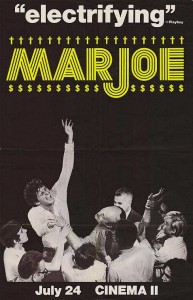|
Genres, Themes, Actors, and Directors:
- Christianity
- Con Artists
- Documentary
- Missionaries and Revivalists
- Religious Faith
Review:
This award-winning documentary-expose will inevitably cause you to cringe, for more reasons than one. While the blatant manipulation of Christians’ faith for profit is undeniably disturbing, we’re by now overly familiar with, for instance, Jim and Tammy Faye Bakker’s corrupt Praise the Lord ministry, among other notorious religious scams. Even more upsetting is watching the attention-seeking Marjoe blithely conning the entire religious community into thinking he still believes what he preaches; while this smooth-talking young man eerily lacks any kind of an overt grudge against his parents for what they put him through (he laughs good-naturedly when discussing his hellish childhood), he ultimately shows himself to be a not much better specimen of humanity, perpetuating the lies he once believed himself.
Filmmakers Sarah Kernochan and Howard Smith do an admirable job capturing the fervent zeal of the Revival congregationalists: their cameras are so close-up at times — circling and whirling with the heaven-sent parishioners — that it’s easy to believe you’re right there with them. Yet I shudder to think about the resentment these naive folks must have felt when seeing themselves up on the big screen, clearly being manipulated from every side. It’s this element which makes Marjoe so much more disturbing to watch than, for instance, either The Miracle Woman (1931) or Elmer Gantry (1960), two fictional films about the Revival racket; at least the extras in those movies were paid for their time, rather than being jilted out of both their money and their pride.
Redeeming Qualities and Moments:
- A fascinating glimpse — through historical footage — of three-year-old Marjoe’s proselytizing power

- A groundbreaking expose of the hypocrisy of Revivalism
 
Must See?
Yes. While disturbing and over-long, this Oscar-winning film remains must-see viewing.
Categories
- Historically Relevant
- Oscar Winner or Nominee
Links:
|




One thought on “Marjoe (1972)”
First viewing. A once-must, for its subject matter and for its solid place in cinema history. (For the record, I don’t think the film is too long; it’s just under 90 minutes.) As per my post in ‘Revival House of Camp and Cult’ (fb):
“It’s gotta all be done under the façade of holiness.”
‘Marjoe’: I’d not seen this until now – while watching I thought, ‘This is close to being a 50-year-old flick – yet this stuff is still with us, and it may just never go away.’ By ‘this stuff’, I don’t just mean the far-reaching con of phony evangelism (though it’s that, too) but the strain in humanity that hungers for and clings to what can best be described as ‘commercial Christianity’. (Watching the people at the ‘meetings’ depicted here made me think of those who are now not only coerced into going to church during a pandemic – but are *eager* to do so.)
As for the subject-at-hand in this 1972 Oscar winner for Best Documentary, Marjoe (a combo of ‘Mary’ and ‘Joseph’) Gortner says early on that, when he was groomed at such a young age to be an evangelist, he never once believed in what he was being told to do… for money: “I don’t know how much came in. As far as i can guess, maybe about 3 million dollars from the times 4 to 14 – and I’ve no idea what happened to that money. I know that *I* never saw it or I never got a piece of it for my education or anything.”
He did get out of ‘the business’ when he was a teen – but, later, he went back into it. He needed money. He didn’t know how to do anything else. The con job was ready money (boy, was it!). It would be interesting to know how Marjoe got connected with the filmmakers – but that seems to be connected to the eventual guilt feelings he harbored… which he explains and which made him give up the sham. At some point, it just wasn’t fulfilling-enough to strut his stuff in front of crowds, like a second-rate Mick Jagger.